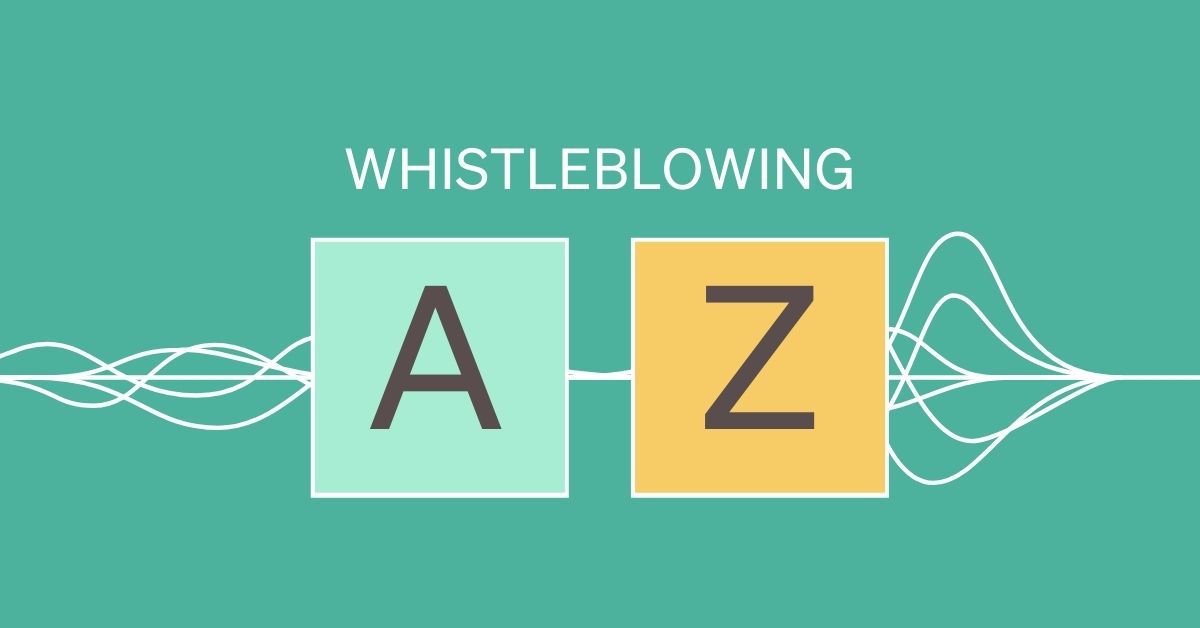
Fraud, corruption, business ethics, and even hotlines, just some of the words we hear when discussing the subject of whistleblowing and whistleblower systems. But what do they all mean?
Find out in this glossary which addresses the most common terms and practices associated with whistleblowing.
This is part two of our glossary, you can read part one here.
Hotline
A whistleblowing hotline is the channel by which someone reports unlawful or unethical behaviour. Traditionally, a whistleblower hotline referred to a telephone-based service, but nowadays it also refers to a type of digital whistleblowing system or a combination of platforms.
See Whistleblower system below.
Internal whistleblowing
When an employee, or any person with insight into an organisation, reports unethical or unlawful behaviour in the workplace, via the company’s own reporting system or whistleblower channel.
Money laundering
An illegal process for converting illegally earned or acquired money into legitimate assets.
Pseudonymisation
A data management procedure used to hide personal information with “pseudonyms”, i.e. fictitious names. A pseudonym can’t be directly linked to a real person without additional information. Pseudonymised data is still personal data covered by data protection regulations.
Public whistleblowing
Whistleblowers may choose to go public by turning to the press or social media with information they have about wrongdoing. This can occur if the person believes reporting internally or externally would lead to retaliation or that no action will be taken. It can also occur when there is an imminent and obvious danger to life, health or safety, or extensive damage to the environment.
Reporting channel
A requirement of the EU Whistleblower Directive is a channel through which someone can report misconduct or a violation. Reporting channels can be written (usually web-based solutions) or oral (by telephone), and should allow for secure two-way communication and feedback.
Retaliation
In relation to whistleblowing, retaliation is when someone, or an organisation, subjects another individual to some form or punishment or ill-treatment for reporting suspected or actual wrongdoing. The EU Whistleblower Directive requires national laws to penalise against those who retaliate.
Transparency
In the workplace, transparency refers to being open and clear with the information that is shared, such as rules, plans, processes and other measures.
Whistleblower
A person who comes forward and discloses information on suspected wrongdoing, misconduct or unlawful activity, usually taking place in a public, private, or governmental organisation. A whistleblower can be an employee, former employee, board member, contractor, or a supplier, basically any stakeholder of an organisation.
Whistleblower protection
Under the new EU Whistleblowing Directive, those ‘blowing the whistle’ and anyone who helps them, are covered by a whistleblower protection law in EU member states.
Whistleblowing
When someone raises concerns about something happening, usually in the workplace, that feels seriously wrong. This isn’t a personal grievance, but concerns about misconduct or breaches of law, such as fraud, bribery, harassment, or issues related to health, safety, or the environment. You may also hear whistleblowing referred to as “raising the alarm”, “making a disclosure” or “speaking up”.
Whistleblowing policy
The course of action or a document that sets out how an organisation handles whistleblowing. This can include information on what it is, how you report misconduct, how to access a whistleblowing function, how a case is handled, what to expect, and how the whistleblowing is protected.
Whistleblowing system
A whistleblower system or channel is a tool for reporting information about workplace misconduct. It includes both a communication channel for whistleblowers and a system for organisations to handle cases.
Go here for more whistleblowing system features
Workplace misconduct
Misconduct in the workplace refers to inappropriate behaviour by employees or other stakeholders, that negatively impacts the organisation, environment or wider society. Misconduct can range from minor to major issues, and may include unethical, unprofessional, or criminal behavior.
Reading tip > 7 examples of workplace misconduct
Wrongdoing
A collective term to describe unlawful and unethical behaviour and activity. In the workplace this can be discrimination, fraud, bribery, harassment, corruption etc. Basically, all that can be reported through a whistleblowing system.
Unethical behaviour
Behaviour or actions that would be considered by most to be morally wrong as they fall outside societal norms. Unethical behaviour can be carried out by individuals or organisations.
Unlawful activity
Actions or behaviour that breaches the law.
Are you interested in learning more about a whistleblower service and safe internal reporting channels? Read more about the EU Directive here and at EUR-Lex.
Are you looking for a safe and secure whistleblowing solution? Read more here.
Would you like to discuss a whistleblower system for your organisation?
Please contact us or book a free demo!
Whistlelink values your privacy. We will only contact you about our solutions.



HAPPY TO MEET YOU!
Whistlelink values your privacy. We will only contact you about our solutions.

HAPPY TO MEET YOU!
Whistlelink values your privacy. We will only contact you about our solutions.
You may unsubscribe at any time. For more info, please review our Privacy Policy
